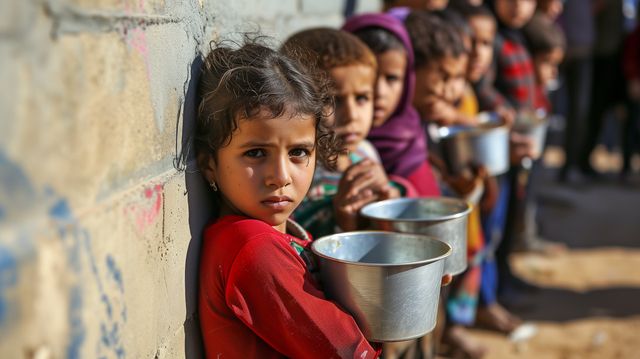The holy month brings stark hardships as food crisis deepens in Gaza
As dawn marked the beginning of Ramadan, the people of Gaza faced a cruel irony. The holy month, traditionally a time of fasting followed by communal iftar feasts, arrives amidst a severe famine threat. The region, battered by five months of conflict, sees its population, already dependent on aid, grappling with intensified food scarcity.
Dr. Amjad Eleiwa from Gaza City’s al-Shifa hospital highlights the dire situation, noting the irony of a forced fast due to lack of food, as residents desperately search for sustenance. Israel’s response to attacks, involving heavy bombardment, has exacerbated the crisis by destroying food infrastructure and hindering aid delivery through stringent security checks.
The Integrated Food Security Phase Classification now indicates that half of Gaza’s population faces starvation, with conditions expected to worsen by July. In northern Gaza, where the crisis is most acute, the absence of suhoor and iftar meals deeply impacts Ramadan’s observance, replacing festivity with a struggle for survival.
Personal accounts from residents like Nadia Abu Nahel, caring for a large family, illustrate the stark contrast between past celebrations and current despair. The healthcare system, overwhelmed by malnutrition and dehydration cases, reveals the human cost of the crisis. Care’s report of deaths, primarily among children, underscores the urgency of the situation.
The conflict’s toll on individuals, such as 16-year-old Rafeeq Dughmoush and his sister Rafeef, personalizes the broader tragedy. Injured in an airstrike, their story of loss and survival amid scarcity highlights the war’s devastating impact on families.
Accusations of using starvation as a weapon have been levelled against Israel, with international voices like the EU’s Josep Borrell condemning the deliberate deprivation of food. Israel, however, refutes claims of intentional starvation, attributing logistical issues to the UN and alleging Hamas’ diversion of aid.
Amidst these allegations, the arrival of food aid from World Central Kitchen offers a glimmer of hope. Yet, it also raises questions about Israel’s fulfilment of its obligations to ensure civilian well-being under occupation. The struggle for survival in Gaza, particularly during Ramadan, paints a grim picture of a population caught between conflict and famine, yearning for relief and normalcy.
